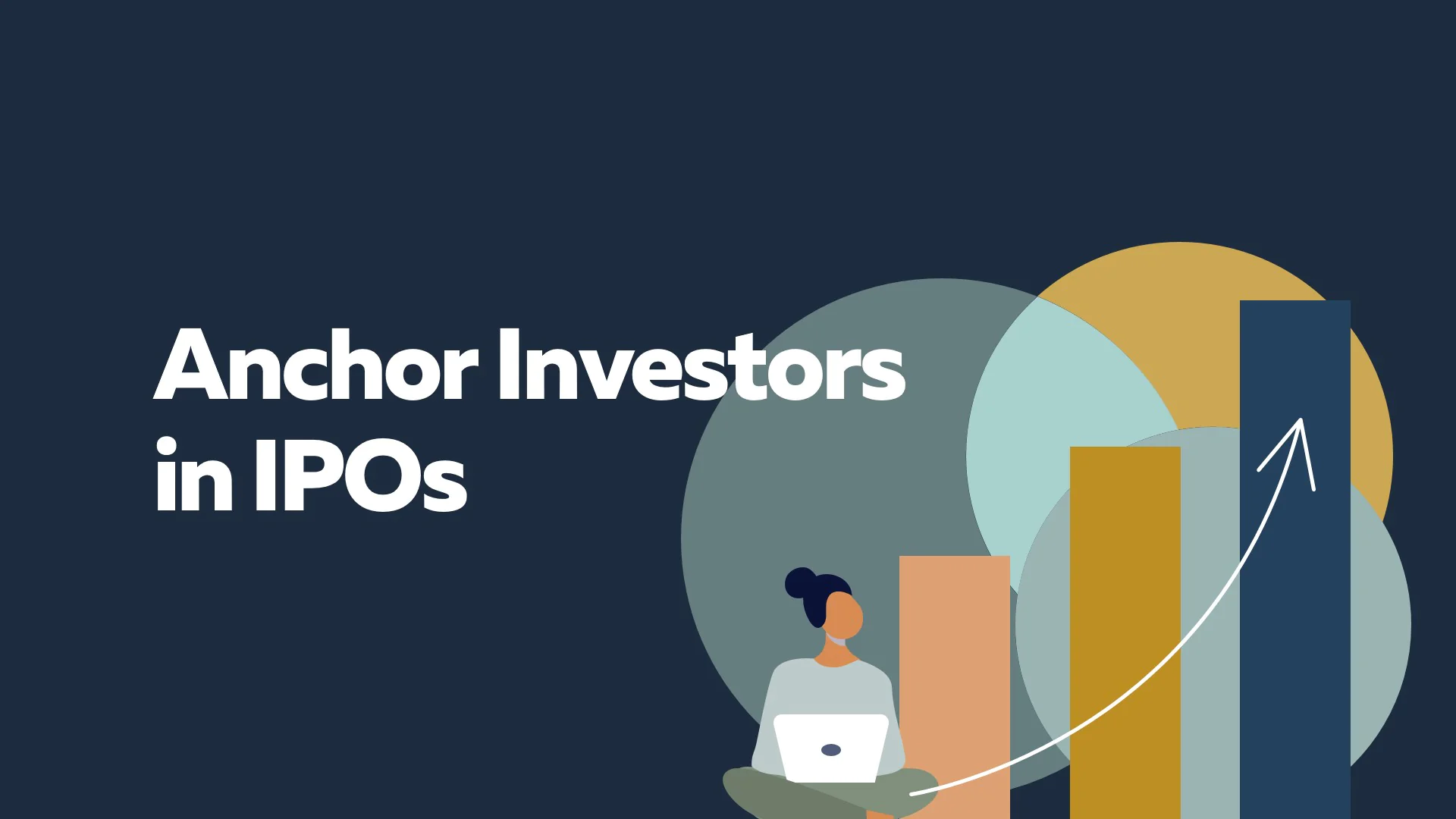An IPO is considered to be a significant achievement in the life of a particular company. It is a process through which a business offers the public for the first time to own small stakes in the business by purchasing the shares. While many small investors cannot wait to get their hands on the shares once the IPO opens, another class of investors help in placing the shares way before the IPO is floated to the public – called Anchor Investors. Speaking of IPO, Anchor Investors are crucial in IPO management, and we will discuss who they are, their role, and how they help companies and shareholders, particularly the retail investors in this article.
Analysis of Anchor Investors
An Anchor Investor is a QIB who invests in a company’s IPOs immediately before the issue is opened for public investment. Their investment often occurs in what is called the pre-IPO stage, which happens a day or two before the actual float. These are given an early invite by the company to ensure that they subscribe to the company hence providing stability and confidence for further subscribers.
Table of Contents
Important Characteristics of Anchor Investors
- Large, Credible Investors: Anchor Investors include large Financial Institution Investors, Mutual Fund Investors, or Foreign Institutional Investors. Due to the recognition they receive because of their height and experience, their initial decision to purchase a certain number of shares is likely to be a positive signal to other people about the company’s stock.
- Fixed Allotment: While normal investors may be restricted to fewer quantities due to excessive demand for the IPO, Anchor Investors are provided a fixed quantity of IPO shares. This is usually in terms of the regulation from the regulatory authorities which enable them to buy up to 60% of the institutional allocation from the overall number operating within the market.
- Lock-in Period: Restrictions on the holding of shares by Anchor Investors: Anchor Investors cannot sell the allocated shares within a certain period and are generally bound at least for 30 days. This floatation period is intended to reduce the volatility of the stock after the IPO has been launched on the market.
As discussed in the previous section, anchor investors’ functions in an IPO are as under:
The primary purpose of Anchor Investor is to give credibility and assurance to an IPO. Holding a position in a particular company from an early stage helps the institutional investors send signals to other both institutional and retail investors hence having a positive effect on the demand for shares. Here’s why they are crucial:
Boosting Confidence:
This is because when reputable Anchor Investors invest in an IPO, other investors are assured that the particular stock they are investing in merits a look. Its investment proves beyond reasonable doubt that they have done research and has high hopes for the company.
Reducing Risk for the Company:
An IPO where Anchor Investors fund the company before the IPO has been launched also has the advantage of minimizing risks for the company. Thus, the companies are assured of the success of the IPO regardless of the market the next day since some of their offerings have been secured earlier.
Setting a Price Benchmark:
Because Anchor Investors purchase their stakes before coming to the public, they usually guide on the price at which an IPO will be sold. If they buy it at a certain price, then this informs other investors about the value that the stock possesses in the market, this becomes a frame of reference for a new demand per se.
Attracting Retail Investors:
When deciding on whether to invest in an IPO, the list of Anchor Investors is usually of interest to retail investors. They may be guided by certain IPO characteristics identifiable with large, reputable institutions to change their view. This is especially true in the markets where the Froth is concerned mostly with the public because retail investors are extremely wary of new firms entering the market.
Flexibility of the Anchor Investors as Relates to their Protagonist Companies
Using Anchor Investors has many advantages for the companies carrying out an IPO. These include:
Financial Security:
That the float for IPO has some assurance of the Anchor Investors’ acceptance of some of the shares before the company goes public is also comforting to the company. This can ease pressure and help the company plan for future development as it identifies where it will source the resources it needs for the next level of growth.
Positive Public Perception:
Anchor Investors can ensure that there is a lot of hype around the IPO due to their popularity. This may cause other institutional as well as individual investors to develop a particular interest in the shares leading to a general interest in the stocks and therefore a high demand for the shares.
Reduced Volatility:
Because Anchor Investors cannot sell their stocks after the IPO immediately due to the lock-in period, it is unlikely to witness an inexperienced person manipulating the price of the stocks during the first few days of the IPO. This makes the market entry of the company’s stock to be easier in the market as compared to when he holds large blocks of shares.
Consequently, Anchor Investors are necessary for the success of an IPO. They incur an early expense to instill that confidence in the stock, afford a stable price and the retail investor shall always follow. In this capacity, they provide consolation to the company and the public market and thus are compulsory to the IPO arrangements.
That brings a question, how do anchor investors benefit?
It should also be pointed out that Anchor Investors help an IPO not only a company but also receive several advantages when investing in an IPO. These include:
Early Access to Shares:
Perhaps one of the most appealing factors attributed to Anchor Investment is the queuing system to buy shares before they go for sale to the general public. This affords them the chance to purchase entities at probably a lower price, all without stacking the self-same with retail traders.
Influence on Pricing:
Because Anchor Investors invest before the IPO is open to the public, the investors get input on the IPO price band. It was also proposed that if more than one Anchor investor is seriously interested in the stock, it may lead to a higher final IPO price. On the other hand, this lack of interest might be indicative of just how much they need a lower price to be charged per share.
Priority Allotment:
The Anchor Investors are awarded a set quantity of shares and this is fundamentally important since they become innocent from insecurity of the IPO instability where the common investors are caught up with the trouble of certifying that they shall not be provided with the total quantity of shares they applied for in case of its seventh oversubscription. This guaranteed allotment is a concern that many financiers do appreciate especially in hot IPOs in the market.
Potential for Long-Term Gains:
Early investment opportunities give Anchor Investors the unique privilege of enjoying the company’s future growth prospects. Once the IPO is complete, they are well placed to make massive gains in terms of share price should the price go up after the floats due to the lock-in agreement.
This paper seeks to answer the following question; How Are Anchor Investors Regulated?
Anchor Investors invest via the book-building process of IPOs and are regulated strictly to prevent manipulation in the process. In India, for example, the Securities and Exchange Board of India (SEBI) mandates certain rules:
Eligibility:
The minimum investment prescribed for Anchor Investors is limited only to Qualified Institutional Buyers (QIBs) which includes mutual fund more banks or insurance companies. This helps to only allow large and experienced investors into the market Thus, the pyramid cannot be manipulated.
Lock-in Period:
However, the Anchor Investors must park their shares for at least 30 days from the date of the issue to the public. It also avoids cases where they develop an intention to sell their stocks instantly thus likely to create a fluctuating market.
Disclosure Requirements:
Companies are required to inform all the details that surround the investment by Anchor Investors, including the number of shares issued and the consideration paid for them under the Red Herring Prospectus (RHP ). It is prepared and made available to the public before the IPO to enable the general public and pcularly the retail investors to know the identities of Anchor Investors and the amount they intend to invest.
Impact on Retail Investors
From the retail investor’s perspective, Anchor Investors are beneficial and can even have manipulation potential. Here’s why:
Sign of Strong Demand:
Since the Anchor investors are credible and reputable institutions, IPO may be seen to have a lot of interest from investors. This can promote the kinds of participation from the retail investors since they see that institutional players see good news in it.
Less Room for Retail Allotment:
It has been observed that because Anchor Investors subscribe to a part of the Institutional Investors’ share, this may at times mean fewer floating shares for the public. In very popular IPO instances; there could be less availability of stock to individual investors because of massive sentiments towards Anchor Investors.
Increased Stock Stability:
A lower Volatility of the stock price after listing can be achieved when there are Anchor Investors, this is because it makes the stock price more stable hence providing an opportunity to the other retail Investors who have little interest in dealing with a lot of fluctuations in the price of their stocks. These institutional investors are usually required to retain the shares for not less than 30 days and this serves to maintain the markets in the initial days of the trading.
Conclusion
Anchor Investors are very important for IPOs. They provide a stable source of funding, belief, and certainty to the market that facilitates the companies to issue the IPO and makes the general public think to invest in the IPO. They can jump in early, basically announcing to other investors, that this stock deserves support, thereby putting more weight behind the IPO success rates.
To the minds of the companies, having Anchor Investors is more than just getting money on board it is having reputable organizations on board. To the ordinary shareholders, these big investors come in as a hedge as the market at times can be very volatile.
In conclusion, the formation of Anchor Investors is economically significant for all the participants of the IPO starting with companies that are going public and ending with dozens of retail investors who are eager to take advantage of newly offered opportunities. This way, their engagement contributes to a highly successful IPO process which promotes increased participation and minimizes risk in the market.




